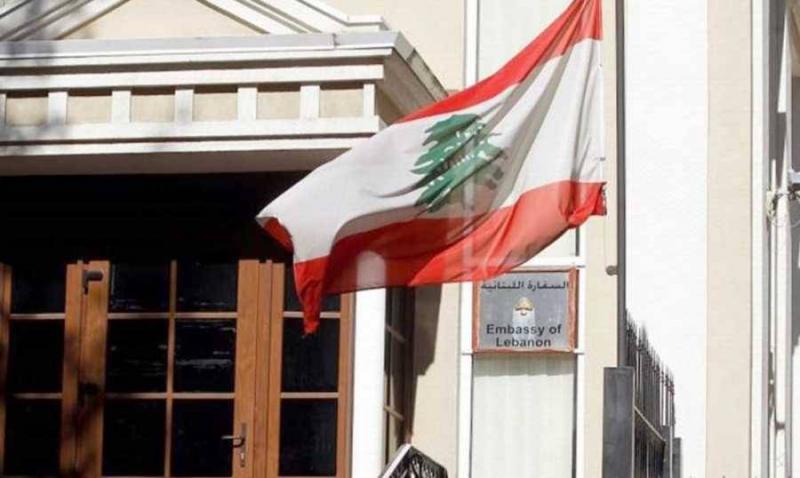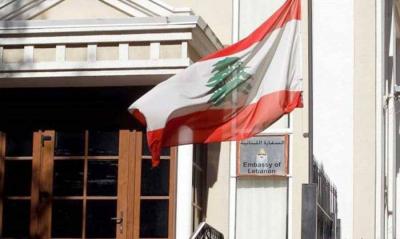Since the beginning of 2022, Lebanon's diplomatic missions abroad have not received their operational expenses, while ambassadors and staff have been awaiting the transfer of their salaries, which have been outstanding since May. The depletion of foreign currency reserves at the Central Bank of Lebanon, reaching critical limits, prompted Central Bank Governor Riad Salameh to adopt an unprecedented austerity policy affecting many sectors, including the situation of Lebanon's diplomatic missions abroad, which are expected to receive transfers in US dollars, unlike those in the public sector in Lebanon who receive their salaries in Lebanese pounds. These missions threaten to go on strike like many sectors in Lebanon to ensure the transfer of their salaries and expenses.
Lebanon has 89 diplomatic missions consisting of 74 embassies and 15 consulates, with an annual total salary expenditure for diplomats reaching about $30 million. The Ministry of Foreign Affairs has been implementing a stringent austerity plan for about two years, significantly reducing the missions' expenses. In recent weeks, the "foreign ministry" issued multiple circulars to heads of diplomatic and consular missions requesting more austerity proposals, especially regarding rental payments, given that about 70% of the mission premises are leased, as well as reconsidering the salaries of ambassadors and staff and halting all annual allocations for celebrations and receptions.
Since 2019, Lebanon has been experiencing what the World Bank has classified as one of the worst economic and financial crises since the mid-19th century. The central bank has consumed most of its hard currency reserves, leading to dollar scarcity and significant loss in the value of the local currency. Sources from the foreign ministry attribute the crisis of salaries and expenses for foreign missions to the fact that the official exchange rate of the dollar remains pegged at 1,500 Lebanese pounds, while its value in the black market has surpassed 34,000 pounds, requiring the Central Bank to secure differences amounting to billions of pounds. They noted that “the delay in salary transfers and covering operational expenses has created discontent among diplomatic missions and led to a raised voice, which we completely understand."
Sources indicate in a statement to "Asharq Al-Awsat" that "the minister has begun implementing an austerity plan that has led to an increase in revenues and a reduction in expenses, but the financial gap remains large. Despite securing consular revenues of about $25 million, there remains a need to secure an additional $45 million to bridge the gap.” They add, "Dialogue is ongoing with the Ministry of Finance to resolve the current issue, and there is a proposal under consideration to suspend some non-essential missions."
Last year, the Minister of Foreign Affairs and Emigrants in the caretaker government, Abdallah Bou Habib, spoke about the possibility of abolishing 12 embassies and consulates based on expenses, revenues, and diplomatic value, but no decision has yet been made regarding the elimination of any of them.
In February, Lebanon requested embassies to seek out donors to help cover their operational costs, mainly by soliciting donations from the Lebanese expatriates.
An informed source on the situation of the missions abroad stated that "the last salary received by diplomats abroad was in May, as they feared at that time that the elections for expatriates would be disrupted, so they rushed to transfer the entitlements. However, the current situation is different for them, and even if some of these dues are paid after weeks or months, things will not return to how they used to be, and salaries and expenses will not be paid monthly."
The source mentioned to "Asharq Al-Awsat" that "the Ministry of Foreign Affairs, like all ministries and administrations, reflects the situation in the country in terms of waste, corruption, irresponsibility, and random spending that has been occurring for decades." Noting that "despite efforts to cut expenses by 30% over two years, there is no effective plan to address the situation, only makeshift solutions instead of focusing, when the current government is formed, on prioritizing significant reforms to reduce expenses."
The source concludes, "There is no possibility of serious treatment for the missions' crisis without reconsidering the existence of many of them, as there are many instances where missions are not needed. Moreover, the work of about 18 economic attachés should be terminated, as they do not have any real tasks in the current financial crisis that is ravaging Lebanon."




